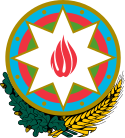Azerbaijani Popular Front Party
This article has multiple issues. Please help improve it or discuss these issues on the talk page. (Learn how and when to remove these template messages)
|
Azerbaijani Popular Front Party Azərbaycan Xalq Cəbhəsi Partiyası | |
|---|---|
 | |
| Leader | Ali Karimli |
| Founders | Abulfaz Elchibey |
| Founded | 1989 |
| Headquarters | Baku, Azerbaijan |
| Ideology | |
| Political position | Centre-right |
| European affiliation | Alliance of Conservatives and Reformists in Europe |
 |
|---|
|
|
The Azerbaijani Popular Front Party (APFP; Azerbaijani: Azərbaycan Xalq Cəbhəsi Partiyası, pronounced [ɑːzæɾbɑjˈdʒɑn xɑlɡ ˈdʒæpæsi] ⓘ) is a political party in Azerbaijan, founded in 1989 by Abulfaz Elchibey. Since Elchibey was ousted from power in the 1993 military coup, the party has been one of the main opposition parties to the Heydar Aliyev and Ilham Aliyev authoritarian regimes.
The party formed in 1989 as an anti-Soviet political movement. The party pushed for Azerbaijani independence from the Soviet Union.[2] The party staged mass protests against the Soviet regime.[2] After Azerbaijan attained independence from the Soviet Union, Popular Front pressured the communist old guard that controlled newly independent Azerbaijan to establish a parliament and allow free elections.[3] The party pressured Ayaz Mutallibov, Azerbaijan's first president to implement democratic reforms and forced him out of power in 1992 when he tried to cancel the 1992 presidential election in a self-coup.[3] Popular Front leader Abulfaz Elchibey was elected in the 1992 election.
The party's policies emphasized democracy, rule of law, and secularism, as well as respect for human rights, religious rights and ethnic minorities.[4]
In the aftermath of the 1993 coup where Elchibey was ousted from power, the party has been blocked from participating in several elections, and prominent individuals associated with the party have been repressed by the Azerbaijan government. The party has also boycotted several elections, citing an unbalanced playing field and repression by the incumbent government.
History
Popular Front of Azerbaijan
The founding congress of the party was held in July 1989.[4]
PFA came to unite several informal public organizations which were established in the 1980s to struggle for the independence of Azerbaijan from the Soviet Union. In 1987, Ali Karimli, a law school student, became the founder and leader of one of these informal organizations - "Yurd" ("Homeland") - that inspired and led thousands of students to the main square of Baku city to protest against the Soviet Union. As a result, a large-scale campaign of public demonstrations and meetings swept across Azerbaijan. Later, the movement was suppressed by the special forces of the Ministry of Defense and Ministry of Internal Affairs of the USSR. Despite this fact, the Popular Front of Azerbaijan was established and Yurd became an integral part of this movement.[citation needed]
Intellectuals associated with the party questioned the official Soviet narrative of the Soviet takeover of Azerbaijan in 1920.[2]
In 1992, Abulfaz Elchibey, the leader of PFA, won the 1992 Azerbaijani presidential election. A period of political, social, and economic reforms followed. The laws on political parties, freedom of press, education, and others were adopted. The country chose a pro-western, liberal economic course and established the national currency, the Azerbaijani manat.[citation needed]
In April 1993, the Russian (formerly Soviet) army was withdrawn from Azerbaijan. Azerbaijan became the first republic in the former USSR, which achieved a full and unconditional withdrawal of Russian troops.[citation needed]
General Heydar Aliyev captured power in 1993 following the 1993 Azerbaijani coup d'état and the Subsequent vote of confidence referendum on Abulfaz Elchibey's presidency. Elchibey was forced to leave the capital city.[citation needed]
Transformation to political party
After Elchibey's death in 2000, the party split into two wings, the reform wing led by Ali Kerimli and the classical wing led by Mirmahmud Miralioglu.
Considering the dramatic and challenging situation facing PFA following the coup, Ali Karimli took the initiative by leading and protecting the organization from the attacks of the new regime from 1993 until 1997 and restoring its political power. In 1995, with the proposal of Ali Karimli and as a result of internal party discussions, the Popular Front of Azerbaijan was reorganized from a social-political movement into a political party. In the same year, the Popular Front Party of Azerbaijan (PFPA) managed to take seats in Parliament, and Ali Kerimli became a leader of the parliamentary party fraction.[citation needed]
In 2000, after the death of PFPA Chairman Elchibey, Ali Karimli was elected Chairman of the Party. In the 2000 parliament elections, PFPA retook seats, and Ali Karimli was elected the leader of the opposition faction in parliament.[citation needed]
The 2003 Azerbaijani presidential election in Azerbaijan fell short of international norms and standards.[5][6] They were followed by another wave of repressions against the opposition.[citation needed] Consequently, PFPA first suggested and then proclaimed the unification of opposition as the surest means to free and fair elections. On 18 March 2005 Popular Front Party of Azerbaijan (PFPA) signed an agreement with other opposition parties to establish a united opposition bloc – "Freedom" - for participation in the parliamentary elections in November 2005.[citation needed]
References
- ^ a b c Nordsieck, Wolfram (2010). "Azerbaijan". Parties and Elections in Europe. Archived from the original on 25 August 2010.
{{cite web}}: CS1 maint: unfit URL (link) - ^ a b c Waal, Thomas de (2013), "Black Garden: Armenia and Azerbaijan through Peace and War", Black Garden, New York University Press, pp. 83–95, doi:10.18574/nyu/9780814770825.001.0001/html?lang=en, ISBN 978-0-8147-7082-5
- ^ a b Altstadt, Audrey L. (2017). Frustrated Democracy in Post-Soviet Azerbaijan. Columbia University Press. pp. 50–51. doi:10.7312/alts70456. ISBN 978-0-231-70456-4.
- ^ a b Cornell, Svante E. (2015). Azerbaijan Since Independence. Routledge. p. 52. ISBN 978-1-317-47620-7.
- ^ "Azerbaijan: Presidential Elections 2003 – Human Rights Watch Briefing Paper" (PDF). Human Rights Watch. 2003-10-13. Archived (PDF) from the original on 2020-09-23. Retrieved 2020-10-21.
- ^ "The Azerbaijan 'Elections' – October 15, 2003". Institute for Democracy in Eastern Europe. 2020-10-21. Archived from the original on 2020-09-04. Retrieved 2020-10-21.
